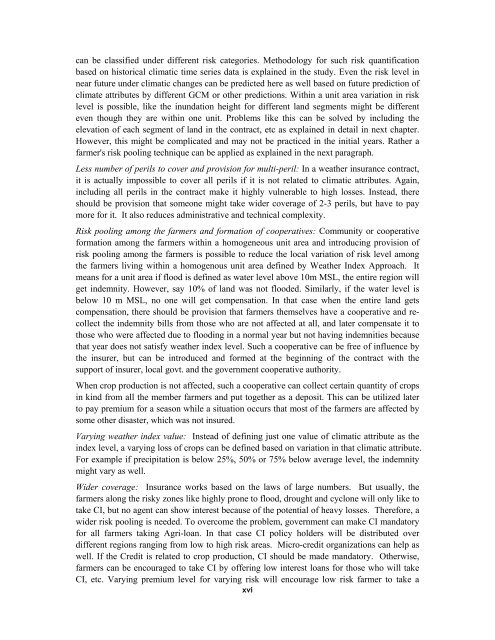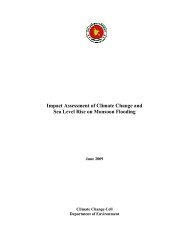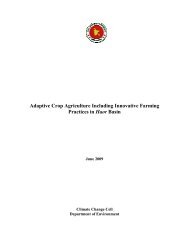Crop Insurance as a Risk Management Strategy in Bangladesh
Crop Insurance as a Risk Management Strategy in Bangladesh
Crop Insurance as a Risk Management Strategy in Bangladesh
You also want an ePaper? Increase the reach of your titles
YUMPU automatically turns print PDFs into web optimized ePapers that Google loves.
can be cl<strong>as</strong>sified under different risk categories. Methodology for such risk quantification<br />
b<strong>as</strong>ed on historical climatic time series data is expla<strong>in</strong>ed <strong>in</strong> the study. Even the risk level <strong>in</strong><br />
near future under climatic changes can be predicted here <strong>as</strong> well b<strong>as</strong>ed on future prediction of<br />
climate attributes by different GCM or other predictions. With<strong>in</strong> a unit area variation <strong>in</strong> risk<br />
level is possible, like the <strong>in</strong>undation height for different land segments might be different<br />
even though they are with<strong>in</strong> one unit. Problems like this can be solved by <strong>in</strong>clud<strong>in</strong>g the<br />
elevation of each segment of land <strong>in</strong> the contract, etc <strong>as</strong> expla<strong>in</strong>ed <strong>in</strong> detail <strong>in</strong> next chapter.<br />
However, this might be complicated and may not be practiced <strong>in</strong> the <strong>in</strong>itial years. Rather a<br />
farmer's risk pool<strong>in</strong>g technique can be applied <strong>as</strong> expla<strong>in</strong>ed <strong>in</strong> the next paragraph.<br />
Less number of perils to cover and provision for multi-peril: In a weather <strong>in</strong>surance contract,<br />
it is actually impossible to cover all perils if it is not related to climatic attributes. Aga<strong>in</strong>,<br />
<strong>in</strong>clud<strong>in</strong>g all perils <strong>in</strong> the contract make it highly vulnerable to high losses. Instead, there<br />
should be provision that someone might take wider coverage of 2-3 perils, but have to pay<br />
more for it. It also reduces adm<strong>in</strong>istrative and technical complexity.<br />
<strong>Risk</strong> pool<strong>in</strong>g among the farmers and formation of cooperatives: Community or cooperative<br />
formation among the farmers with<strong>in</strong> a homogeneous unit area and <strong>in</strong>troduc<strong>in</strong>g provision of<br />
risk pool<strong>in</strong>g among the farmers is possible to reduce the local variation of risk level among<br />
the farmers liv<strong>in</strong>g with<strong>in</strong> a homogenous unit area def<strong>in</strong>ed by Weather Index Approach. It<br />
means for a unit area if flood is def<strong>in</strong>ed <strong>as</strong> water level above 10m MSL, the entire region will<br />
get <strong>in</strong>demnity. However, say 10% of land w<strong>as</strong> not flooded. Similarly, if the water level is<br />
below 10 m MSL, no one will get compensation. In that c<strong>as</strong>e when the entire land gets<br />
compensation, there should be provision that farmers themselves have a cooperative and recollect<br />
the <strong>in</strong>demnity bills from those who are not affected at all, and later compensate it to<br />
those who were affected due to flood<strong>in</strong>g <strong>in</strong> a normal year but not hav<strong>in</strong>g <strong>in</strong>demnities because<br />
that year does not satisfy weather <strong>in</strong>dex level. Such a cooperative can be free of <strong>in</strong>fluence by<br />
the <strong>in</strong>surer, but can be <strong>in</strong>troduced and formed at the beg<strong>in</strong>n<strong>in</strong>g of the contract with the<br />
support of <strong>in</strong>surer, local govt. and the government cooperative authority.<br />
When crop production is not affected, such a cooperative can collect certa<strong>in</strong> quantity of crops<br />
<strong>in</strong> k<strong>in</strong>d from all the member farmers and put together <strong>as</strong> a deposit. This can be utilized later<br />
to pay premium for a se<strong>as</strong>on while a situation occurs that most of the farmers are affected by<br />
some other dis<strong>as</strong>ter, which w<strong>as</strong> not <strong>in</strong>sured.<br />
Vary<strong>in</strong>g weather <strong>in</strong>dex value: Instead of def<strong>in</strong><strong>in</strong>g just one value of climatic attribute <strong>as</strong> the<br />
<strong>in</strong>dex level, a vary<strong>in</strong>g loss of crops can be def<strong>in</strong>ed b<strong>as</strong>ed on variation <strong>in</strong> that climatic attribute.<br />
For example if precipitation is below 25%, 50% or 75% below average level, the <strong>in</strong>demnity<br />
might vary <strong>as</strong> well.<br />
Wider coverage: <strong>Insurance</strong> works b<strong>as</strong>ed on the laws of large numbers. But usually, the<br />
farmers along the risky zones like highly prone to flood, drought and cyclone will only like to<br />
take CI, but no agent can show <strong>in</strong>terest because of the potential of heavy losses. Therefore, a<br />
wider risk pool<strong>in</strong>g is needed. To overcome the problem, government can make CI mandatory<br />
for all farmers tak<strong>in</strong>g Agri-loan. In that c<strong>as</strong>e CI policy holders will be distributed over<br />
different regions rang<strong>in</strong>g from low to high risk are<strong>as</strong>. Micro-credit organizations can help <strong>as</strong><br />
well. If the Credit is related to crop production, CI should be made mandatory. Otherwise,<br />
farmers can be encouraged to take CI by offer<strong>in</strong>g low <strong>in</strong>terest loans for those who will take<br />
CI, etc. Vary<strong>in</strong>g premium level for vary<strong>in</strong>g risk will encourage low risk farmer to take a<br />
xvi





